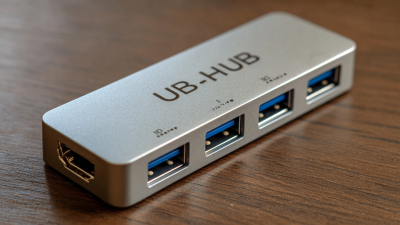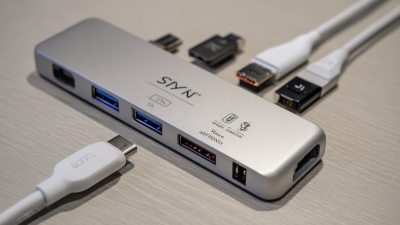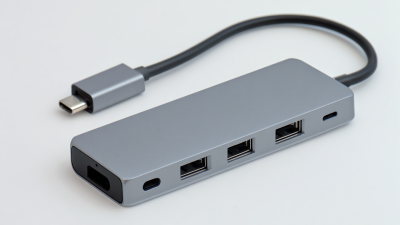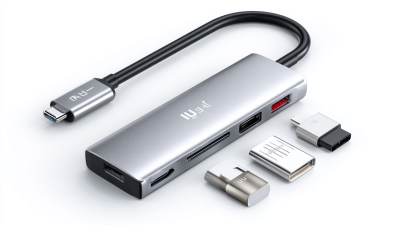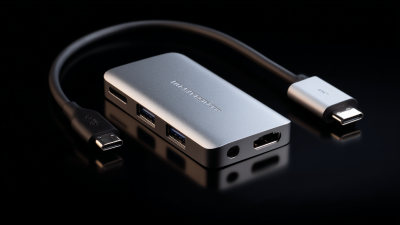
-
Home
-
Products
-
About Us
-
OEM&ODM
-
News
-
Contact Us
Inquiry
Form loading...

In today's digital world, the need for seamless connectivity has never been greater, especially with the increasing reliance on multiple devices for work and entertainment. One essential tool that can help streamline your setup is the USB Hub Ethernet Adapter. This versatile device not only expands your device's connectivity options but also enhances network performance, ensuring that you stay connected wherever you are.

However, with a plethora of options available on the market, choosing the right USB Hub Ethernet Adapter can be a daunting task. Whether you are a casual user looking to connect a few peripherals or a tech-savvy professional in need of robust solutions for high-speed internet access, it's crucial to understand the features that matter the most.
In this blog, we will discuss key factors to consider when selecting the ideal USB Hub Ethernet Adapter for your needs, helping you make an informed decision that will elevate your digital experience.
When choosing the right USB hub Ethernet adapter, there are several factors to consider that will align with your specific needs. First and foremost, evaluate the number and type of ports you require. A good adapter should offer multiple USB ports in addition to the Ethernet connection, ensuring compatibility with various devices like printers, external hard drives, and other USB peripherals. Additionally, check the data transfer speeds for USB and Ethernet. If you frequently transfer large files or stream high-definition content, opt for an adapter that supports USB 3.0 or higher and Gigabit Ethernet for optimal performance.

Another crucial aspect is portability. If you’re frequently on the go, consider a lightweight and compact design that easily fits into your bag without adding bulk. Look for adapters with durable materials that can withstand some wear and tear, especially if you plan to travel frequently. Finally, ensure that the adapter is compatible with your operating system; a well-rounded adapter will function seamlessly across different platforms, making it versatile for various users. By keeping these factors in mind, you can make an informed decision that enhances your connectivity and meets your daily needs.
 When selecting a USB hub Ethernet adapter, understanding the various Ethernet standards is crucial to ensure compatibility and performance. The latest IEEE 802.3df standard, which brings forth 800G Ethernet capabilities, is a testament to the rapid advancements in data transfer rates. This evolution not only supports high-speed applications but also paves the way for innovative technologies across multiple sectors, including data centers and cloud computing. As Ethernet celebrates its 50th anniversary, we are reminded of the significant milestones that have shaped the technology landscape, with advancements like the 802.3cg standard allowing single-pair Ethernet to operate at speeds up to 10 Mbps over distances of 1,000 meters.
When selecting a USB hub Ethernet adapter, understanding the various Ethernet standards is crucial to ensure compatibility and performance. The latest IEEE 802.3df standard, which brings forth 800G Ethernet capabilities, is a testament to the rapid advancements in data transfer rates. This evolution not only supports high-speed applications but also paves the way for innovative technologies across multiple sectors, including data centers and cloud computing. As Ethernet celebrates its 50th anniversary, we are reminded of the significant milestones that have shaped the technology landscape, with advancements like the 802.3cg standard allowing single-pair Ethernet to operate at speeds up to 10 Mbps over distances of 1,000 meters.
The emergence of new standards such as Automotive Ethernet and Time Sensitive Networking (TSN) highlights the ongoing demand for efficient, reliable connectivity in various applications. Automotive Ethernet, governed by the IEEE 802.3 working group, is particularly noteworthy as it enhances communication within vehicle systems. Meanwhile, the necessity for updates to the IEEE 802.3 standards reflects the growing demand for Ethernet solutions in diverse fields, ranging from industrial automation to space exploration. Choosing the right adapter means not only considering these standards but also how they align with your specific needs, ensuring seamless connectivity and sustained performance in today’s fast-paced technological environment.
When selecting the right USB hub Ethernet adapter, it’s essential to focus on key features that align with your specific needs. Look for adapters that support USB 3.0 or newer versions, as they offer faster data transfer speeds (up to 5 Gbps) compared to USB 2.0's 480 Mbps. A recent market survey indicates that over 60% of professionals prefer USB 3.0 hubs for enhanced performance, especially when handling large data transfers or streaming high-definition videos.
Another critical feature is the type and number of ports available. A versatile adapter should include multiple USB ports alongside an Ethernet port, allowing you to connect various devices simultaneously. According to industry insights, models with at least three USB ports are favored by 75% of users for their ability to manage multiple peripherals without compromising on performance.
**Tip**: Always check for compatibility with your operating system. Some adapters may not work optimally on all platforms. Ensure that the adapter comes with the necessary drivers or is plug-and-play for seamless integration. Additionally, consider the build quality; adapters made with durable materials tend to last longer, providing reliable connectivity for years to come.
| Feature | Description | Recommended Use |
|---|---|---|
| Port Variety | Number and type of USB ports (USB-A, USB-C, etc.) | Ideal for users with multiple devices requiring connectivity. |
| Ethernet Speed | Data transfer rates supported (e.g., 1 Gbps, 2.5 Gbps, etc.) | Essential for high-speed internet users and gaming. |
| Power Supply | Whether it is powered by the bus or has an external power supply | Important for powering high-demand peripherals. |
| Compatibility | Supported operating systems (e.g., Windows, macOS, Linux) | Necessary for multi-platform users. |
| Size and Portability | Dimensions and weight of the adapter | Ideal for users on the go who need a compact solution. |
| Build Quality | Material and durability of the adapter's casing | Useful for users looking for a long-lasting device. |
| Additional Features | Unique features like built-in SD card reader or HDMI output | Enhances functionality for creative professionals. |
When selecting the right USB hub Ethernet adapter, understanding performance and price is crucial for making an informed decision. According to a recent report by TechRadar, adapters that offer USB 3.0 connectivity can provide speeds of up to 5 Gbps, significantly improving data transfer rates compared to their USB 2.0 counterparts, which max out at 480 Mbps. Additionally, newer models often integrate advanced technologies, such as Power Delivery, which can simultaneously charge devices while ensuring a stable internet connection—a feature that can be particularly beneficial for users needing to maximize efficiency.
On the pricing front, market analysis from Statista indicates that the average cost of a reliable USB hub Ethernet adapter ranges between $20 to $60, depending on the brand and capabilities. While cheaper models may suffice for occasional users or basic applications, professionals relying on consistent high-speed performance might prefer investing in higher-end models that boast enhanced durability and performance. Furthermore, adapters that support multiple ports not only offer convenience but can also represent a better value over time by eliminating the need for multiple devices.
When considering the right USB hub Ethernet adapter for your needs, it's essential to understand the common use cases and the benefits they offer.
USB hub Ethernet adapters are particularly useful for those who require stable internet connections while connecting multiple devices simultaneously. For instance, users with laptops that have limited ports can benefit greatly from these adapters, allowing them to connect an Ethernet cable for a reliable internet connection, alongside peripherals like keyboards, mice, and external drives.
In addition to enhancing connectivity, these adapters are becoming increasingly relevant with the introduction of devices featuring USB-C ports. For example, many modern smartphones, including the latest models, now utilize USB-C, which makes it easier to find compatible adapters that offer both charging and data transfer capabilities.
The versatility of USB hubs allows for seamless integration of various devices, turning them into powerful setups for both work and entertainment. Whether you’re a remote worker needing a stable connection, a gamer requiring multiple inputs, or a content creator managing various tools, a USB hub Ethernet adapter can streamline your workspace and enhance productivity.
